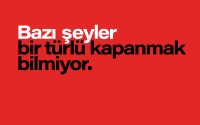Tamar Rotem5 Mart 2004
"I knew that one day someone would come along and ask. I expected this," said a young soldier to journalist Nadire Mater, who came to interview him about his impressions of the war. Mater - who interviewed Turkish soldiers who were at the front during the conflict with the Kurds in 1984-1989 - did not at all expect to be accepted with warmth, but she discovered that the Turkish soldiers wanted to tell the real story of the war. The Turkish journalist's lecture opened the conference on "Soldier Testomonies and Human Rights," held this week under the auspices of the Minerva Center for Human Rights at Hebrew University of Jerusalem. Her personal story, though tied to a different war, casts light on the drama of soldiers everywhere. When she tried to track down such testimonies in other countries, she discovered that the official version is always given by the generals and, she said, "the young people who served at the front ... were forced to keep quiet." The Turkish authorities were less enthusiastic about the soldiers' versions of events.
"Mehmet's Book," Mater's work based on testimonies of soldiers who fought in southeastern Turkey, which was published in 1999, was banned in her country. She was put on trial a short time later on ridiculous charges that she had insulted the army (among other things, ostensibly in cooperation with the American Central Intelligence Agency). But following international criticism, she was acquitted and the was book returned to the shops.
The rhetorical question, "Are they going to talk?" in the title of her lecture was particularly relevant in the Israeli context. Mater was interested mainly in the distress the soldiers felt during moments of fear and in the weaknesses they evinced - that is, in everything the authorities try to conceal in their presentation of rosy and patriotic picture of young people keen to serve their country. It would appear that in the local context, her question takes on another, sharper significance, as soldiers observe or participate actively in carrying out injustices toward the civilian population in the territories.
The conference in Jerusalem, the climax of extensive preparatory research and the establishment of a database of soldiers' testimonies (on the Internet as well) by Hebrew University center in cooperation with the University of Maryland, has brought the voices of low-ranking soldiers to the forefront of consciousness. Soldiers who deal with routine activities and carry out orders. Moreover, participants in the conference tried to analyze the motivations, moral and other, that impel them to report and serve as "eyes" for human rights organizations.
Other motives
Uri Blau, who was the military correspondent for the Jerusalem weekly Kol Ha'ir from 2000 to 2002, related that only very few soldiers contacted him to report a problematic procedure or order, or an instance of immoral behavior. Far more frequently, he said, he was contacted by soldiers (or their mothers) about abusive training practices or conditions of service. There were those who spoke to him for totally other reasons. Publicity, for example. There were soldiers who were convinced that their corps was not getting enough exposure or who wanted to take revenge on their commanders.
In this context, especially prominent were three soldiers, two of them religious (and one of whom is a Jewish settler in the territories), whose conscience gave them no rest. The most outstanding voice of the three was a company commander in the ultra-Orthodox Nahal (pioneering youth) unit, a graduate of a hesder yeshiva (which combines religious studies and military service). Blau said that the company commander contacted him after lengthy and genuine deliberations and the realization that an internal report within the Israel Defense Forces did not have the power to change the system. His report was continuous, in real time. He even agreed to give testimony in his own voice for a film that was made for a British television program, though he was, of course, not identified.
Reporting on violations of human rights in the territories comes by and large from the victims. Eric Goldstein, the coordinator of the "Soldiers' testimonies" project on behalf of the University of Maryland, estimated that most of the efforts of the human rights organizations are invested in this realm because the people in charge are interested in getting the victims' voices heard. But, in fact, the value of soldiers' testimony for these organizations is worth its weight in gold.
From the point of view of an organization such as B'Tselem, the Israeli Information Center for Human Rights in the Occupied Territories, which engages in collecting information about human rights violations, the soldiers are an important source for balancing and complementing the picture that is described by the Palestinians. Jessica Montell, the executive director of B'Tselem, related that with the help of soldiers doing compulsory service, the organization has obtained information that is kept vague, such as with respect to rules of engagement, which is not published officially, and it has also received information about the way certain incidents have happened to cross-check them with the official version.
Thus, for example, from the testimony of a soldier who participated in Operation Defensive Shield (that was published in a B'Tselem brochure including the testimony of soldiers and Palestinians about the operation), it is possible to learn of scorn for human life:
"I was in the armored personnel carrier and over the field radio, I heard that in the wadi they were pursuing some wanted Palestinians who had fled. They saw a Palestinian fellow there and shot him. He was hit in the buttocks. When they got there they saw that he wasn't armed. He was hemorrhaging and the medic who was in the field said that he had to get treatment. A doctor couldn't get to him because of the topographical conditions. An order came down from the brigade to leave him there even though he was dying. I heard the battalion commander say that it was necessary to get on with more important things and that they should inform the Palestinians afterward through the coordination and liaison office that they have a body in the wadi."
Montell regrets that B'Tselem succeeded in obtaining testimony from only 35 soldiers during the period of the intifada and the Oslo Accords - as compared to reports from hundreds of Palestinians. She is not afraid of sounding blunt and explained that the main value of the testimony is the reliability of the Israelis, as compared to the Palestinians; the organization has a great interest in changing Israeli public opinion.
Worthless testimony
Why then do the Israeli soldiers speak out so rarely? The soldiers are witness to immoral, cruel things, but it is difficult to make use of their testimony in the legal context, complained another conference speaker, attorney Yossi Wolfson of the HaMoked Center for the Defense of the Individual (an organization that grants legal aid and deals with defense of Palestinian rights).
"In order to try to reconstruct successful testimony, on which I could build a case, I have had to go through dozens of files. The soldiers lie. They don't remember and they coordinate their versions and therefore their testimony isn't worth much in the legal sense," Wolfson said, adding in amazement: "They are our friends, they study in the same educational system. They are people like us. And they should have spoken."
Most astonishingly - and contrary to the disappointment that is expressed by human rights activists or journalists - researchers in this field believe that relative to other countries, informal reporting by soldiers flows freely in Israel, in the press, in literature and in documentary films, despite the military censorship and the compartmentalization of the IDF Spokesman's Office.
"Israeli society is more open," said Prof. Eyal Ben-Ari of the department of sociology and anthropology at Hebrew University, who researches the IDF. The fact that "the whole nation is an army" also facilitates the flow of information.
But Ishai Menuchin, head of the Yesh Gvul (There's a Limit/Border) movement and a lecturer in political science at Hebrew University, chose to use the image of "shooting and crying" to describe the Israelis. He said that most of the reports come from soldiers who participated in the criminal acts and only in retrospect - sometimes years later (such as the book by Liran Ron Furer, "Checkpoint Syndrome") - asked themselves what happened. Blau noted that soldiers tend to talk about the army with their friends, but they won't talk about the distressing, ugly things. The roadblocks, for example. These are not subjects that mothers ask them about, he noted.
Menuchin attributed the blurring of soldiers' moral sense to the concept of the "good soldier." This term is taken from a soldier's testimony about an order to break an Arab's arms and legs, during which he kept saying that he was a good soldier so he carried out the order. A good soldier in the IDF is one who obeys orders, without thinking. "I don't believe in the IDF procedure of [giving] `a blatantly illegal order,'" said Menuchin, in reply to a question from the audience at the conference about the validity of this procedure. "It simply doesn't work."
He believes that the discourse in Israel concerning soldiers has changed over the years. "When I was a boy, they talked about `uncle- soldier.' Today we tend to talk about the soldiers as children. We talk about psychology and not morality. As children they are victims of the circumstances. They do not have the moral strength to deal with the reality. They are not responsible for their actions."
Editor Ilana Hammerman also related to the discourse: "The blunt, raw language is the main `hero.' It, more than anything else, reveals the significance and the absurdity of the stories that are told, of the reality about which they testify." Her book, "Poets Will Not Write Poems" (Am Oved, 1990), was devoted to testimonies by soldiers from the first intifada.
"There isn't a sentence in them or a word in them that wasn't in what the soldiers said," she told the conference audience of the monologues in the book. She explained that by turning testimonies about the harassment of Palestinians into a literary text, she wanted to rescue them from oblivion. But she was disillusioned: "The political effectiveness of the testimonies is meager to the point of despair."
In the Yesh Gvul movement, however, they believe it is possible to undertake educational activities to make soldiers people of conscience; they begin with the young people before they are recruited, an arena that the army cannot control. The attempt, explains Menuchin, is to paint a realistic picture for them of what happens in the territories, with the help of testimonies by young people who have been there. Their stories, he believes, will help prepare the recruits for the friction with the local population and its results, and especially for the issue of how to set and identify red lines: "The problem is that when you get into these politically and emotionally difficult situations, there is no time to think. You have to decide right on the spot."
According to him, the military socialization process prevents the soldiers from dealing with these emotional issues, and as a result many young Israelis repress the criminal acts they have seen or participated in: "The stupid slogans about `One for all and all for one,' the immortalization of friendship, the comradeship at arms, the excuses about how it is forbidden to abandon friends - all these are aimed at helping people forget what they have seen. Do you know how many young people are wandering around the East in order to forget?" he asked.
In December the first Yesh Gvul conference of young people before their induction was held at Tzavta Tel Aviv, and about 100 young people came. The second will be held next week at Beit Shmuel in Jerusalem.
The subjects that will be discussed there will be: "What are blatantly illegal orders? What are war crimes? What are my obligations as a soldier (male or female) and the army's obligations toward the population that is living under occupation?"
The State of Israel is apparently not interested in exposing young people to these difficult issues, Menuchin explained. Therefore, the meetings are held outside the schools or IDF preparatory frameworks, which close their gates to the soldiers' testimonies. This material is too "subversive": "In all of those frameworks, the aim is to produce soldiers for elite units. Good soldiers, not thinking soldiers."
Mothers speak out
At the conference, research on Machsom (Checkpoint) Watch, by Merav Maimon and Prof. Eyal Ben-Ari, was presented for the first time. This movement was established by a group of women, who stand at roadblocks to observe soldiers' activities and to intervene in the event that there are human rights violations. The researchers found that the movement, along with other human rights organizations, has a certain amount of influence on the army.
The main influence, says Ben-Ari, should be understood in the context of the greater openness within the IDF to a kind of humanitarian discourse and an awareness of human rights issues (the introduction of the ethical code, for example). The motivation for this is not inherent, but rather derives more from sensitivity to public relations, as well as an attempt to imitate modern armies like that of the United States, which in recent years has also adopted moral codes.
However, the women's influence is evident mainly at the roadblocks themselves. Ben-Ari says that from the soldiers' point of view, the presence of women (the image is of motherliness) is less threatening and they are prepared to listen to them. Their success also derives from their modes of action. Ben-Ari says the women intentionally imitate military practices: They are out in the field, they go out in cohesive units and their observations are routine and carried out daily.
"Because of the use of military modes of action, to a large extent it is possible to relate to the testimonies of the women of Machsom Watch in the same way as to soldiers' testimonies," says Ben-Ari. (T.R.)






